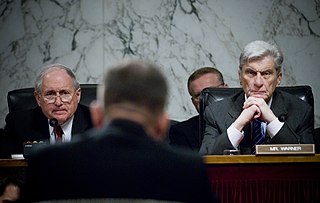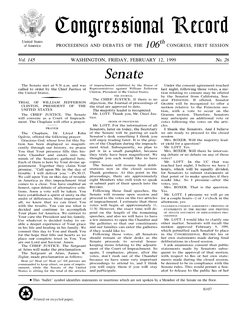Related Research Articles
The United States Government Publishing Office is an agency of the legislative branch of the United States Federal government. The office produces and distributes information products and services for all three branches of the Federal Government, including U.S. passports for the Department of State as well as the official publications of the Supreme Court, the Congress, the Executive Office of the President, executive departments, and independent agencies.

The Congressional Research Service (CRS) is a public policy research institute of the United States Congress. Operating within the Library of Congress, it works primarily and directly for members of Congress and their committees and staff on a confidential, nonpartisan basis. CRS is sometimes known as Congress' think tank due to its broad mandate of providing research and analysis on all matters relevant to national policymaking.
The United States budget process is the framework used by Congress and the President of the United States to formulate and create the United States federal budget. The process was established by the Budget and Accounting Act of 1921, the Congressional Budget and Impoundment Control Act of 1974, and additional budget legislation.

A congressional committee is a legislative sub-organization in the United States Congress that handles a specific duty. Committee membership enables members to develop specialized knowledge of the matters under their jurisdiction. As "little legislatures", the committees monitor ongoing governmental operations, identify issues suitable for legislative review, gather and evaluate information, and recommend courses of action to their parent body. Woodrow Wilson once wrote, "it is not far from the truth to say that Congress in session is Congress on public exhibition, whilst Congress in its committee rooms is Congress at work." It is not expected that a member of Congress be an expert on all matters and subject areas that come before Congress. Congressional committees provide valuable informational services to Congress by investigating and reporting about specialized subjects.

The United States Senate Select Committee on Intelligence is dedicated to overseeing the United States Intelligence Community—the agencies and bureaus of the federal government of the United States that provide information and analysis for leaders of the executive and legislative branches. The Committee was established in 1976 by the 94th Congress.
The U.S. Senate Select Committee on Ethics is a select committee of the United States Senate charged with dealing with matters related to senatorial ethics. It is also commonly referred to as the Senate Ethics Committee. Senate rules require the Ethics Committee to be evenly divided between the Democrats and the Republicans, no matter who controls the Senate, although the chairman always comes from the majority party. The leading committee member of the minority party is referred to as Vice Chairman rather than the more common Ranking Member.

The Congressional Record is the official record of the proceedings and debates of the United States Congress, published by the United States Government Publishing Office and issued when Congress is in session. The Congressional Record Index is updated daily online and published monthly. At the end of a session of Congress, the daily editions are compiled in bound volumes constituting the permanent edition. Chapter 9 of Title 44 of the United States Code authorizes publication of the Congressional Record.

The Federal Depository Library Program (FDLP) is a government program created to make U.S. federal government publications available to the public at no cost. As of April 2021, there are 1,114 depository libraries in the United States and its territories. A "government publication" is defined in the U.S. Code as "informational matter which is published as an individual document at Government expense, or as required by law".

The Joint Economic Committee (JEC) is one of four standing joint committees of the U.S. Congress. The committee was established as a part of the Employment Act of 1946, which deemed the committee responsible for reporting the current economic condition of the United States and for making suggestions for improvement to the economy. The JEC is currently chaired by Representative Don Beyer of Virginia.

The United States Code Congressional and Administrative News(U.S.C.C.A.N.) is a publication that collects selected congressional and administrative materials. U.S.C.C.A.N. was first published in 1941 and has continued to be published in monthly pamphlets. Among other documents, U.S.C.C.A.N. publishes the full text of new federal laws, presidential proclamations, executive orders, federal regulations and sentencing guidelines. Prior to the 99th Congress, the legislative history materials in contained only a House or Senate report. It is recommended by the Bluebook as a citation source.
The United States Congressional Serial Set began in 1817 as the official collection of reports and documents of the United States Congress. The collection was published in a "serial" fashion, hence its name. It has been described as the "nation's most treasured publication" and beloved by librarians as "part of their most valued holdings."
A United States congressional hearing is the principal formal method by which United States congressional committees collect and analyze information in the early stages of legislative policymaking.

The 116th United States Congress was a meeting of the legislative branch of the United States federal government, composed of the Senate and the House of Representatives. It convened in Washington, D.C., on January 3, 2019, and ended on January 3, 2021, during the final two years of Donald Trump's presidency. Senators elected to regular terms in 2014 finished their terms in this Congress, and House seats were apportioned based on the 2010 Census.
In the United States Congress, a conference report refers to the final version of a bill that is negotiated between the House of Representatives and the Senate via conference committee. It is printed and submitted to each chamber for its consideration, such as approval or disapproval. It contains the "statement of managers," a section-by-section explanation of the agreement.
The Constitution of the United States of America: Analysis and Interpretation is a publication encompassing the United States Constitution with analysis and interpretation by the Congressional Research Service along with in-text annotations of cases decided by the Supreme Court of the United States. The centennial edition of the Constitution Annotated was published in 2013 by the 112th Congress, containing more than 2,300 pages and referencing almost 6,000 cases.
In the United States Congress, a bill is proposed legislation under consideration by either of the two chambers of Congress: the House of Representatives or the Senate. Anyone elected to either body can propose a bill. After both chambers approve a bill, it is sent to the President of the United States for consideration.
Congressional archives consist of records and personal papers that document the history and activities of the United States Congress. The National Archives and Records Administration’s Center for Legislative Archives collects and preserves the official administrative and legislative records of the U.S. Senate and the U.S. House of Representatives. The personal papers of individual senators and representatives, broadly called congressional collections, are the private property of members of Congress. Many members choose to donate their papers to repositories where their records are preserved and made available to the public.

Hugh Nathanial Halpern is an American government official serving as the director of the United States Government Publishing Office. He is the 28th person to lead the agency.
References
- ↑ "Congressional Documents". GPO. Retrieved 2014-01-27.
- ↑ "Library Resources for Administrative History: Congressional Serial Set". National Archives and Records Administration . Retrieved 2014-01-27.